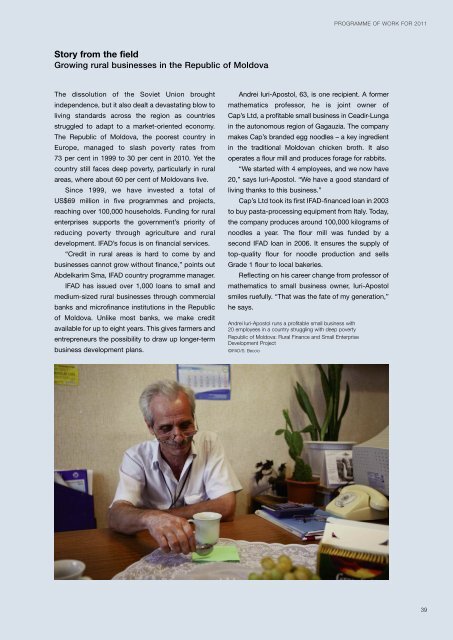ANNUAL REPORT 2011 - IFAD
ANNUAL REPORT 2011 - IFAD
ANNUAL REPORT 2011 - IFAD
You also want an ePaper? Increase the reach of your titles
YUMPU automatically turns print PDFs into web optimized ePapers that Google loves.
Story from the field<br />
Growing rural businesses in the Republic of Moldova<br />
The dissolution of the Soviet Union brought<br />
independence, but it also dealt a devastating blow to<br />
living standards across the region as countries<br />
struggled to adapt to a market-oriented economy.<br />
The Republic of Moldova, the poorest country in<br />
Europe, managed to slash poverty rates from<br />
73 per cent in 1999 to 30 per cent in 2010. Yet the<br />
country still faces deep poverty, particularly in rural<br />
areas, where about 60 per cent of Moldovans live.<br />
Since 1999, we have invested a total of<br />
US$69 million in five programmes and projects,<br />
reaching over 100,000 households. Funding for rural<br />
enterprises supports the government’s priority of<br />
reducing poverty through agriculture and rural<br />
development. <strong>IFAD</strong>’s focus is on financial services.<br />
“Credit in rural areas is hard to come by and<br />
businesses cannot grow without finance,” points out<br />
Abdelkarim Sma, <strong>IFAD</strong> country programme manager.<br />
<strong>IFAD</strong> has issued over 1,000 loans to small and<br />
medium-sized rural businesses through commercial<br />
banks and microfinance institutions in the Republic<br />
of Moldova. Unlike most banks, we make credit<br />
available for up to eight years. This gives farmers and<br />
entrepreneurs the possibility to draw up longer-term<br />
business development plans.<br />
Andrei Iuri-Apostol, 63, is one recipient. A former<br />
mathematics professor, he is joint owner of<br />
Cap’s Ltd, a profitable small business in Ceadir-Lunga<br />
in the autonomous region of Gagauzia. The company<br />
makes Cap’s branded egg noodles – a key ingredient<br />
in the traditional Moldovan chicken broth. It also<br />
operates a flour mill and produces forage for rabbits.<br />
“We started with 4 employees, and we now have<br />
20,” says Iuri-Apostol. “We have a good standard of<br />
living thanks to this business.”<br />
Cap’s Ltd took its first <strong>IFAD</strong>-financed loan in 2003<br />
to buy pasta-processing equipment from Italy. Today,<br />
the company produces around 100,000 kilograms of<br />
noodles a year. The flour mill was funded by a<br />
second <strong>IFAD</strong> loan in 2006. It ensures the supply of<br />
top-quality flour for noodle production and sells<br />
Grade 1 flour to local bakeries.<br />
Reflecting on his career change from professor of<br />
mathematics to small business owner, Iuri-Apostol<br />
smiles ruefully. “That was the fate of my generation,”<br />
he says.<br />
Andrei Iuri-Apostol runs a profitable small business with<br />
20 employees in a country struggling with deep poverty<br />
Republic of Moldova: Rural Finance and Small Enterprise<br />
Development Project<br />
©<strong>IFAD</strong>/S. Beccio<br />
PROGRAMME OF WORK FOR <strong>2011</strong><br />
39

















